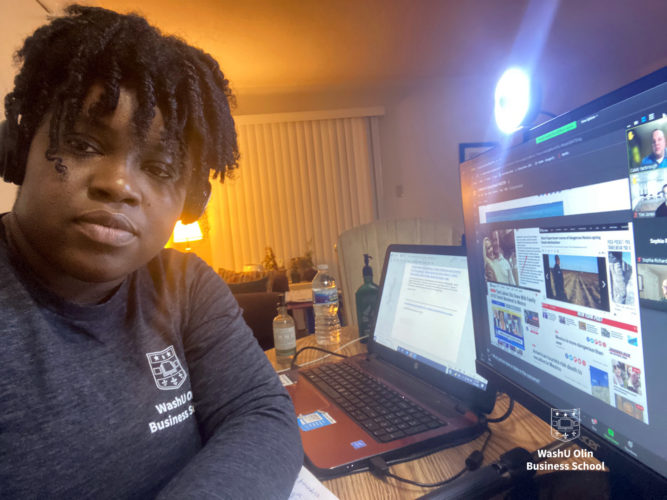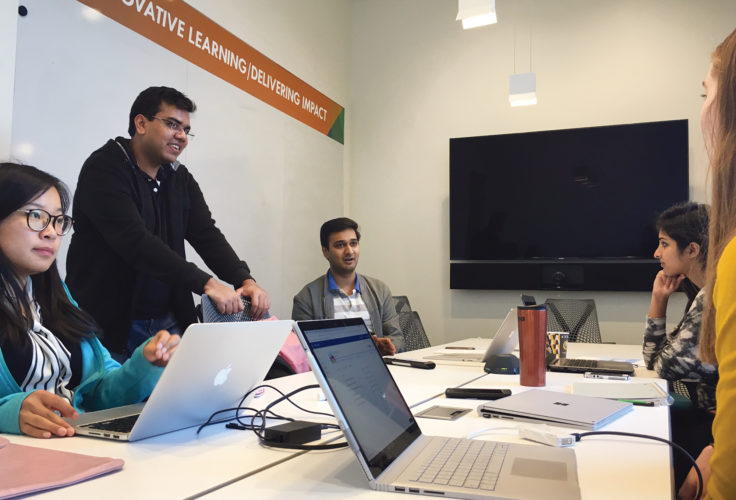The validity and worth of an online MBA program are constantly being discussed and debated these days. Prospective students are full of questions and concerns as they delve into higher education. How does an online program measure up to an in-person, full-time experience? Can an MBA prepare students for the ever-changing hybrid world of work we now find ourselves in?
For students, the differences between online and in-person education options can seem giant. But in reality, the credibility and content of these two modes of learning are very similar. So how can prospective students decide which method is the right fit?
What makes an online MBA program different?
Over the past decade, online education has risen in popularity, and this rise has accelerated rapidly over the duration of the COVID-19 pandemic when moving in-person programs online was the only way to ensure people could attend and learn without disruption. In a remarkable turn of events, the pivot from in-person programs to online delivery provided all students and instructors with a firsthand introduction to the flexibility, accessibility and affordability that technology can bring to the learning experience.
Online programs also match the way our workplaces are changing. If we are increasingly working in hybrid or remote workplaces, a course of study that gives a comparable experience might be the best way to learn.
But we also live in a world run (at the moment) by people who attended college in person and on campus; the people who teach MBA programs most certainly did. What this means is that the learning experience is still catching up with technology, creating opportunities for online students to mold their courses into what they need.
If you’re switching careers and looking to maximize your opportunities with traditional campus recruiters or someone looking for the social stimulation of in-person networking in the traditional MBA experience, a full-time program on campus might be the logical choice for you. By studying full-time and not working, you can invest large chunks of time into attending recruiting events and seminars in your chosen sector, learning the language and the culture of the industry, and preparing to enter the world of work without the pressure of actually being in it already.
For others, though — especially those looking forward to a hybrid workplace culture that’s reliant on technology — an online program may serve you better. The skills of relationship-building online, remote collaboration, video presentation, independent research, and adaptability will all be invaluable for a successful career in today’s world.
How does an online MBA program meet the needs of today?
What are the benefits of an online program when it comes to students getting the best MBA experience? Can an online course of study trump a full-time campus experience in 2022? The short answer is a resounding yes for a handful of reasons:
We’re moving into an online experience in many realms.
The world of business will never return to its pre-pandemic form. There’s no reason your education should be orthogonal to the world, which is very much online. Many domains still require an in-person element — live theater, for example, or dentistry — but work and school are not in that category.
The online program has a digital emphasis.
The online program at Washington University’s Olin Business School provides a laboratory space that connects your learning and work. In this world we’re in, where the employment environment is increasingly a technology-enhanced experience and employers are desperately seeking people to help them make the most of new technologies, the Olin Business School Online MBA gives students an unmatched opportunity to see the full potential of digitalization, a chance to work with colleagues using these tools, and innovative ways to experiment with them in a context different from work. Students work out a virtual persona in the context of the program and practice ways to further advance in their careers and help their companies, all in a safe digital learning space.
The digital experience is refining constantly.
Traditional learning experiences take a long time to change, but the online experience is much nimbler and is shifting all the time. Olin is capturing tons of data about how people learn and what people want and need from a course. The program is in the early stages of tracking engagement, refining materials, and bringing the best of new technologies into the program. Because of this, the Online MBA has a huge amount of untapped potential to customize an MBA experience to the individual student.
Students can get a more diverse experience.
Online study levels the playing field, opening up the MBA experience to a wider range of students geographically, culturally and academically. The ability to tailor content and experience to the individual student’s needs provides a more personalized development path and a more meritocratic environment in which all students succeed. Students also get to learn in the presence of more people who have a wider diversity of backgrounds, interests and ages, as well as learn from an increased roster of teachers, too.
A digital MBA program is, at its best, a state-of-the-art sandbox—a space where students can play with new work tools, new technologies and their own goals before heading into the experience of a hybrid, shifting workplace. Olin Business School is innovating the digital MBA experience with all its resources and care to empower every student to craft a learning experience that suits them and the way they want to work in the future.







